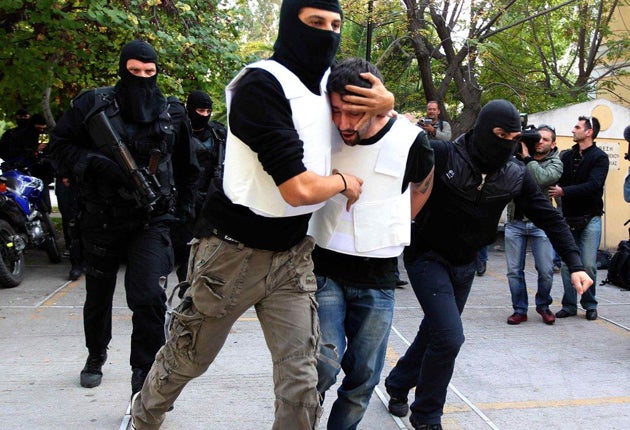Merkel targeted by Greek terror groups in parcel bomb campaign
Packages delivered to embassies in Athens thought to be work of far-left extremists

Your support helps us to tell the story
From reproductive rights to climate change to Big Tech, The Independent is on the ground when the story is developing. Whether it's investigating the financials of Elon Musk's pro-Trump PAC or producing our latest documentary, 'The A Word', which shines a light on the American women fighting for reproductive rights, we know how important it is to parse out the facts from the messaging.
At such a critical moment in US history, we need reporters on the ground. Your donation allows us to keep sending journalists to speak to both sides of the story.
The Independent is trusted by Americans across the entire political spectrum. And unlike many other quality news outlets, we choose not to lock Americans out of our reporting and analysis with paywalls. We believe quality journalism should be available to everyone, paid for by those who can afford it.
Your support makes all the difference.Greece suspended all overseas air shipments of mail and parcels for 48 hours yesterday following a wave of attacks by suspected leftist guerrillas on government targets in several west European countries.
Small bombs exploded at the Swiss and Russian embassies in Athens on Tuesday, a package with explosives was intercepted at the German chancellor's office and a Greek police source said Italian authorities were examining a suspect package found on a courier plane from Athens.
Police had already arrested two Greeks, aged 22 and 24, on Monday in possession of two bombs including one addressed to French President Nicolas Sarkozy.
German police last night disarmed a parcel bomb at Chancellor Angela Merkel's office, the second leader targeted in a violent campaign blamed on Greek far-left extremists angered by deep government austerity cuts.
More than 10 booby-trapped packages were discovered at offices, embassies and the airport in Athens. The plot was uncovered on Monday when one makeshift device detonated inside the offices of a courier company injuring a member of staff.
Two devices exploded at the Swiss and Russian embassies yesterday while being handled by staff but nobody was hurt, police said. A third was detonated at the Bulgarian embassy in a controlled explosion.
Police searched the streets after Monday's explosion and arrested two men in disguise carrying handguns and with a mailbomb addressed to French President Nicolas Sarkozy. One of the detainees was already wanted by police as a suspected member of Conspiracy of Fire Nuclei, a far-left extremist organisation that has carried out dozens of arson and minor bomb attacks against government buildings and the offices and homes of Greek politicians. The suspects, aged 22 and 24, have refused to identify themselves or be fingerprinted. Other targets included the embassies of Belgium, Chile, Germany, Mexico and the Netherlands.
"The threat is very serious. We are extremely vigilant and I am following it very closely," Mr Sarkozy said yesterday during a press conference in London with David Cameron.
The news of the attacks led to a wave of reported sightings of suspicious packages across Athens. In Berlin, the office of German Chancellor Angela Merkel said staff had seized another package that "would have been able to harm people," according to her spokesman. Ms Merkel was in Belgium at the time.
Several German media outlets cited sources as saying the package was personally addressed to Ms Merkel and the Greek Economy Ministry was given as the return address. Police said the devices were potentially lethal. "The more compact these package, the greater the explosion. They can even kill," a senior police officer said.
Greece has witnessed a revival in extremist activity. Tensions have simmered between the country's security establishment and deeply entrenched left-wing groups since the end of a seven-year military dictatorship in 1975.
With help from Scotland Yard, in 2002 Greek police dismantled the country's deadliest organisation, November 17. They had killed 23 people from 1975 to 2000, including the British defence attaché Stephen Saunders.
But attacks on police and state targets have intensified following the shooting of a 15-year-old teenage boy by police in 2008 that sparked youth riots in several Greek cities.
"The collapse of November 17 coincided with the emergence of a new generation of terrorist groups - more brutal, less ideological and much more willing to take risks in order to cause maximum social damage," said analyst Roman Gerodimos. "This new wave of attacks against foreign embassies could be seen as an attempt to harm Greece's international image and economic stability amidst the country's biggest economic crisis in decades."
The Greek government condemned the strikes. Spokesman George Petalotis said that "criminal efforts to terrorise and disturb social peace will be in vain".
In May, Conspiracy of Fire Nuclei planted a bomb at a court in Thessaloniki that injured a court employee.
Join our commenting forum
Join thought-provoking conversations, follow other Independent readers and see their replies
Comments